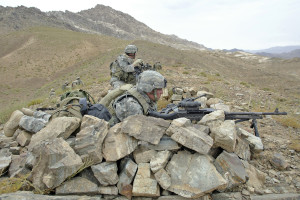Waking Up From the American Dream
As we read headline after headline highlighting political gridlock, anemic economic conditions, and violent wars abroad, it’s easy to glean the common theme from the news: America is struggling. Our economy and political system have collapsed, and our international clout has diminished. People are increasingly skeptical of whether the US remains the world’s superpower.
 The first decade of the 21st century saw the slowest economic growth since World War II, and the second decade promises little better. While technically the US economy is no longer in recession, GDP grew at an annual rate of 1% in the second quarter of this year, which is nowhere near large enough to kick-start a weak economy recovering from a severe financial collapse. Many fear a double-dip recession. The stock market has recently swung wildly between large losses and large gains, demonstrating great instability in the financial sector.
The first decade of the 21st century saw the slowest economic growth since World War II, and the second decade promises little better. While technically the US economy is no longer in recession, GDP grew at an annual rate of 1% in the second quarter of this year, which is nowhere near large enough to kick-start a weak economy recovering from a severe financial collapse. Many fear a double-dip recession. The stock market has recently swung wildly between large losses and large gains, demonstrating great instability in the financial sector.
And as the US stagnates, many other countries grow, despite the global recession. China’s GDP grew at an annual rate of 9.5% in the second quarter, and some projections have China overtaking the US in total GDP as early as 2015. As globalization intensifies, the risk of economic downturn in the US increases. Companies find it easier to move their business overseas to faster growing economies, allowing our economic malaise to spiral out of control. Long-term economic projections for the US do not look good, and there are few easy solutions.
While the country struggles, our politicians fail to act to help our flailing economy. The debt ceiling debate displayed the worst aspects of our political system, with congressmen holding the economy hostage in order to advance their political agendas. Our degree of political gridlock allowed a downgrade of our credit rating from Standard & Poor’s. In their report, S&P explains, “The downgrade reflects our view that the effectiveness, stability, and predictability of American policymaking and political institutions have weakened at a time of ongoing fiscal and economic challenges.” The debt deal came down to the wire, and if enough congressmen had refused to compromise, our country would have defaulted on its debt, leading to an even worse economic crisis.
Although deficit reduction has taken center stage in Washington, we continue to push off instituting necessary reforms. Education reform ought to be made a priority. Only a third of 8th grade students are proficient in math, science, or reading. And although the amount of spending per student has doubled (accounting for inflation) since the 1970s, test scores have remained the same. George W. Bush’s education reform program, “No Child Left Behind,” has done little to help students, and a public school system that was once a model for other countries has fallen behind them. In short, our public education system is crumbling.
In addition to education reform, the country badly needs to revamp its immigration policy. There are an estimated 11million illegal immigrants living in the US. Not only does this issue demand attention for the sake of those immigrants who live in fear of deportation, but also because it poses a security risk in an era of terrorist attacks.
Education and immigration reforms are only two of the many issues that pose problems for our future and command our attention now. Prison populations are growing, global warming is rising, and income inequality is increasing, and President Obama’s health care act did little to stem the rising costs of medical services. These issues deserve the attention of our politicians, but unfortunately they are too busy fighting to find the solutions to these pressing issues. Soon it may be too late.

While domestic issues remain unresolved and threaten to sink our nation, the US struggles to assert itself internationally. Our engagements in Iraq and Afghanistan have proved to be much more difficult than previously thought, with trillions of dollars spent and thousands dead. Although Iraq is in a much better state than it was a few years ago, the country is experiencing an increase in militant strikes and a crumbling power-sharing agreement. The US is beginning to withdraw from Afghanistan despite an increase in Taliban attacks and unprepared Afghan security forces. In both wars, the US has struggled with its counterterrorism strategy, proving that a handful of insurgents can stymie the greatest military in the world.
The Arab Spring has also demonstrated America’s limited power in establishing democracy in the Middle East. We watched on the sidelines as unrest grew in Tunisia, Egypt, Yemen, Bahrain, and Syria. As governments cracked down on protesters, we chose to involve ourselves in only one nation: Libya. For half a year, we’ve taken a hands-off approach, shelling Muammar Qaddafi’s forces from afar in order to avoid fully engaging in the conflict. Therefore, recent rebel gains in Libya cannot wholly be attributed to the US. The “leading from behind” strategy reveals America’s reluctance to get embroiled in another long, difficult war in a country that is not a security interest.
In addition to our military struggles, our diplomacy has come up short as well. We have been unable to avert continued government oppression in Syria, despite our use of sanctions and denunciations of President Bashar al-Assad. No progress has been made in the Israeli-Palestinian peace process in years, despite President Obama’s best efforts to bring both sides to the table. North Korea is still in possession of multiple nuclear warheads, and Iran continues to assemble its first nuclear weapon. Pakistan still refuses to cooperate with American forces seeking to contain terrorism in Pakistan’s northwest regions. Our country has invested significant resources in each of these efforts but has little to show for it.
While America has faced difficult times lately, we should not be pessimistic about the future. Our country has never been able to simply dictate the development of world events, and change usually comes slowly. Although we may need to come to terms with our decreased influence, America remains the most powerful nation in the world. We boast the largest economy and military by far. And our refusal to double down in Libya is not a sign of impotence, but of maturity on the part of the military. The failure to build democracies in Iraq and Afghanistan has highlighted the follies of the Bush Doctrine, and the Arab Spring has demonstrated that democracy is spread faster by those who seek it for themselves than by those who seek it for others. Thus, President Obama has been wise to remain largely uninvolved in the revolutions that have swept across the Middle East. In fact, the slow progress in Libya shows that “leading from behind,” while not the most attractive phrase, might be the smartest military option. In that sense, our approach in Libya might be representative of future US foreign policy.
And while we have struggled in recent years, we are by no means in a poor position. Our public education system is falling apart, but we are still home to the best universities in the world (about half of the top 100 universities are in the US). Our nation funds one-third of worldwide research and development, and we generate 48% of the world’s patents. Increasing immigration indicates how attractive the US remains for people worldwide. And Congress’s high disapproval rating will hopefully lead politicians to appreciate the need to compromise in order move forward.
Although our nation is under stress, our primary concern should be our ability to control the pace of world events. So rather than viewing this time as one of decline, we should view it as an opportunity to mature. Rather than permitting financial institutions to take risks to rapidly increase growth, we should aim for slow and steady growth. And as budget deficits grow out of control, we should see this as a chance to reform our long-term fiscal outlook while preserving the best features of government spending. We should be patient and know that change and growth happen slowly. If we can accept this, the US will remain the master of its own fate.